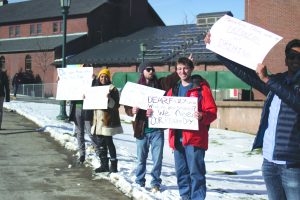‘Voices’ Make up for low turnout
Student protesters marched through campus and into academic buildings Jan. 25 in opposition of the Faculty Senate’s decision to remove reading days.
Senior Alexander Collingsworth organized the event, and said he feels the protest has to do with more than just the removal of reading days.
“This is about the Faculty Senate and the administration respecting what students think, respecting the student voice,” Collingsworth said. “This is an incident of the SGA, which is supposed to be the body that represents us, being completely ignored.”

The Faculty Senate voted April 13, 2015 to remove reading days from the academic calendar, starting in the 2016-2017 academic year, according to a Dec. 9 Cynic article.
This decision was made to “reduce the downtime fostering undesirable student behavior, including the Naked Bike Ride and other excesses that are disruptive to students preparing for final assessments,” according to the 2014-2015 Annual Report from the Student Affairs Committee of the Faculty Senate.
“The Faculty Senate and SGA are sham democratic bodies in my mind, elected officials in offices created to give the illusion of choice,” senior Duncan Gamble said. “I definitely believe more transparency was and must be necessary and provided, and more involvement of the general student body, on par with the levels involved in the recent smoking ban, was absolutely justified and entirely ignored.”
After meeting at the library, the protesters marched through Central Campus. They entered the Davis Center atrium and moved into Brennan’s Pub, chanting and displaying their signs to a packed lunch crowd.
“If you don’t participate, nothing will happen,” Gamble said. “The administration will own you.”
After protesting in the Davis Center, the group of students marched toward the Waterman building, continuing to chant in unison throughout campus. When they entered Waterman, they approached the executive offices but were locked out by an administrator.
The group moved upstairs into Waterman Manor, where they entered the dining room and chanted their message to a small group of diners and employees.
The group of students then returned to the executive offices on the first floor of Waterman, where the door was unlocked. The protesters entered the lobby and were confronted by Gary Derr, vice president for executive operations.
Derr said to the protesters that the Naked Bike Ride was a factor, but that other elements were taken into account when making the decision.
Derr explained that the Faculty Senate consulted SGA, but that he’ll pass the protesters’ message along to administration.
SGA President Jason Maulucci said he has been communicating with the Faculty Senate regarding the change, which was first proposed last year.
“They had been claiming that the SGA or the student body was consulted before this had happened, when in fact that’s not true,” Maulucci said. “It was very preliminary and up in the air. The one thing we said ‘hell no’ to was ‘don’t touch our reading days.’”
Maulucci said the committee pushed the proposal, which removed reading days, through the Faculty Senate without consulting the SGA again, or the student body in general.
Maulucci said, however, that the Faculty Senate knows they made a mistake in not reaching out to SGA again, and that he doesn’t think a similar one will be made again. He said that Thomas Chittenden, the chairman of the committee which drafted the proposal, had his heart in the right place.
“I think they truly thought students would be okay with this because we’d look at it and say ‘Okay, at least we’re getting a little October break and we’d prefer that over the other,’” Maulucci said. “There was no intent to harm students in any way.”
Maulucci emphasized the message that reading days are critical to the mental health of students.
“I had so many personal stories of people saying ‘I suffer from depression or severe anxiety disorder and I need my reading days to not only address my mental health concerns but prepare to succeed academically,” Maulucci said.
Collingsworth also said he feels reading days are crucial to the mental wellbeing of students.
“One woman in the Davis Center was really offended by us. She said she’s working full time and has a kid and still manages to study for exams,” Collingsworth said. “I get that and good for her, but the fact remains that this is a mental health issue.”
“Without reading days students are going to be more stressed out than they already are,” he said. “A lot of kids have serious issues with anxiety and depression. Messing with that is a bad idea.”
Collingsworth said he wished more people attended the protest. He plans to organize another protest for the Feb. 8 Faculty Senate meeting, according to a post on the event’s Facebook page Jan. 25.
“We could have used more bodies, but we made up for it with our voices,” he said.
Maulucci said he has appointed a task force with SGA members and external students headed by SGA senator Bhumika Patel, a junior. They will be responsible for presenting alternatives to the proposed academic schedule.
The SGA will determine an alternative and draft it into a formal resolution to pass along to the Faculty Senate before spring break, Maulucci said.
Faculty Senate members have not yet responded to request for comment.

Bryan is the managing editor of the Vermont Cynic and has been involved since Jan. 2015. Prior to his position as managing editor, he was a news writer...









